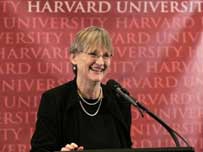William James at Harvard
William James: In the Maelstrom of American Modernism, Robert D. Richardson, 2006

For an interview with the author see: William James
A now famous characterization captures the essence of William James writing style; his ability to communicate difficult concepts through stories, contrasting his style with that of novelist brother Henry James;
Rebbecca West first observed in 1916, that one of the James brothers grew up to write fiction as though it were philosophy, and the other to write philosophy as though it were fiction.
William James association with Harvard spans the period from the low point of the money grabbing diploma mill that was Harvard prior to and during the civil war to the guild ed age of Harvard in the late nineteenth century. James received an M.D. degree from Harvard which consisted of receiving a passing mark from five of nine examiners during an oral examination. In other words, a Harvard medical doctor may have failed four of his nine final exams.
Much of the glory of the gilded age under President Charles W. Eliot, is due in no small part to William James and his colleagues of the Philosophy department including Josiah Royce, Hugo Munster berg, George Herbert Palmer, Charles Sanders Peirce, and George Santayana. This department included the most distinguished and famous collection of thinkers ever assembled at an American institution and perhaps ever assembled anywhere. Classic American Philosophers: Peirce, James, Royce, Santayana, Dewey, Whitehead
James and Santayana represented new trends in philosophy and psychology portending existentialism and psychoanalysis: the introduction of modernism; Other department members were scholars in the traditions of Kant and Hegel. James loved to argue with these scholars but was famously open, insisting his students be exposed to their thought in their own words, inviting them to lecture in his classes, and arguing vehemently with them. He considered these old fashioned scholars good friends and colleagues.
Yet, both James and Santayana felt themselves alienated from Harvard and its stratified social life. Both were highly critical of Harvard’s curriculum and its PhD programs. At the height of Harvard’s gilded age both James and Santayana remained critical of the widening social class distinctions and exclusive social circles and clubs at Harvard. Student housing was segregated by class with the “Gold Coast” at the pinnacle and only the very most exclusive class was welcomed into Boston society.
William James fought for and finally received permission for gifted Mary Calkins, a teacher at Wellesley College, to attend his graduate psychology seminar taught by Royce and James. Calkins was the first woman to be granted this privilege at Harvard.

Drew Gilpin Faust named first female president since 1636 founding.
One of James most important insights borrows from Cardinal John Henry Newman “God has two families of children on this earth, the once born and the twice born (today born again).” The former are born happy and view God as the animating spirit of a beautiful harmonious world. Examples for James were Ralph Waldo Emerson and Walt Whitman. The twice born James views as sick souls. These sick souls may find community, solace, and comfort in religion but they remain sick and should never be entrusted with power.
The book is replete with great quotes from James and Santayana.
On zeal faith and fanaticism:
There is no worse enemy of God and Man than zeal armed with power and guided by a feeble intellect… The great lesson of history is to keep power of life and death away from that kind of mind, the mind that sees things in the light of evil and dread and mistrust rather than in that of hope. William James
The trouble about your robust and full-bodied faiths, however, is, that they begin to cut each other’s throats too soon. William James
Fanaticism consists in redoubling your effort when you have forgotten your aim. George Santayana
On the Monroe Doctrine and American Imperialism
In 1895 President Cleveland, invoking the Monroe Doctrine, threatened Britain with war over its interference in Venezuela. James wrote “We have written ourselves squarely down as a people dangerous to the peace of the world…Three days of fighting mob-hysteria at Washington at any time can undo the peace-habits of a hundred years.” Godkins, editor of Nation replied to James, “The newspapers stand between this generation and the light…The press is now the great enemy of good government and of rational views of human affairs.” James wrote to another “Cleveland in my opinion by his explicit allusion to war has committed the biggest political crime I have ever seen here.” Teddy Roosevelt wrote to the Crimson Tide supporting war to uphold “the honor and dignity of the United States, the honor of the American flag” … “If Harvard men wish peace with honor they will heartily support the national executive and the national legislature in the Venezuela matter; will demand that our representatives insist upon the strictest interpretation of the Monroe Doctrine; and will farther demand that immediate preparations be made to build a really first class navy.” James replied “May I express a hope that in this university, if no where else on the continent, we shall be patriotic enough not to remain passive whilst the destinies of our country are being settled by surprise.“